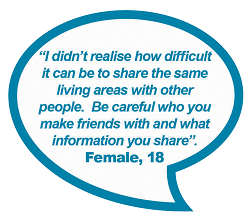Having considered everything, if you still feel that moving out is your best or only option, there are different housing options:
Supported Accommodation is for vulnerable young people who have nowhere else to go and who would not be able to live on their own without support.
Supported Accommodation is for young people aged 16 to 24 who have nowhere else to live. It offers accommodation, support and training as a package and young people need to get involved with the support offered, otherwise they can lose their accommodation. This is a short term solution to homelessness that allows people to live independently whilst teaching them independent living skills at the same time, such as cooking, cleaning, paying bills etc.
Usually people living in supported accommodation are allocated a Support Worker/Independent Living Worker to help them learn independent living skills, such as budgeting and paying bills. Tenancy training is also a part of the plan. You only stay in supported accommodation until you are ready to move on and your support worker will help you find the right accommodation for you.
If you succeed in your tenancy and decide to move on to a Council tenancy (provided you are over 18), your Band will be increased. A "Band" means what level of priority you are on the Council tenancy list (A being highest priority, E being the lowest).
Homestays can offer a home environment for young people aged 16 to 17 who are open to a Social Worker or Care Leavers aged 16 to 25. Young people stay in the homes of providers who provide support of 7 to 10 hours per week with a view to teaching independent living skills. If you are interested in finding out more and about whether your young person may be eligible for a Homestays placement, check out the Homestays webpage.
You can also rent from a private landlord. This usually requires 1 month rent in advance, and a deposit which is kept by the landlord in case of any damages until you move out. You may be able to get some help with the deposit through the DiGS scheme. Find details of your local Council office for more information on the Housing for young people - useful contacts | Westmorland and Furness Council page.
If you are single and claiming benefit, the most you are likely to be able to afford would be a flat share or house share.
Local newspapers and shops will often advertise flat shares or rooms for rent. This can often be a cheaper option than living in your own place, but remember you will be sharing with other people and other people's annoyances and rules!
Council offices often have lists of local landlords that they work with. They are a good starting point for information.
The majority of accommodation comes unfurnished. Would you be able to furnish it yourself?
It may be worth asking friends and family if they have any items that they could donate or, if you have money to buy furniture, checking out local furniture reclaim centres, you could grab a bargain. Also check out the Preloved website or other local selling pages. Moving out of home will also mean you are going to be responsible for your own washing, cooking and ironing.
There are lots of agencies that can help you, have a look at the Housing for young people - useful contacts | Westmorland and Furness Council for your District/area to see what is available.
If you'd like some support with your situation get in touch with us.
- Emmie Sutherland (Barrow and South Lakes) on 07825 313726
If we can't help, we may be able to put you in touch with someone who can. Alternatively, if you are 18+, there are other support agencies available. You can find contact details on the Housing for young people - useful contacts | Westmorland and Furness Council page.
Your social worker or Youth Homeless and Housing Officer, will explain your rights. You can also speak with an independent advocate from National Youth Advocacy Service (NYAS).
Children's Social Care is responsible for accommodating young people aged 16 or 17 who are homeless under the Children's Act 1989.
The Homelessness Reduction Act 2017 has increased local authority's duties to assess an applicant, who is homeless or at risk of homelessness with 56 days, to prevent or relieve homelessness.
You can find out more about your rights by speaking with NYAS and by looking at the following legislation:
- Children's Act 1989
- Homelessness Reduction Act 2017
- Housing Act 1996.
National Youth Advocacy Service (NYAS)
Telephone: 0808 808 1001
